Key takeaways:
- Venue location significantly impacts attendance and guest experience; accessibility and emotional connection are crucial.
- Consider venue capacity, layout, and amenities to enhance engagement and ensure a functional event space.
- Understanding local audience preferences and demographics can shape event planning to create more meaningful experiences.
- Flexibility and thorough venue research are essential to overcoming challenges and ensuring event success.
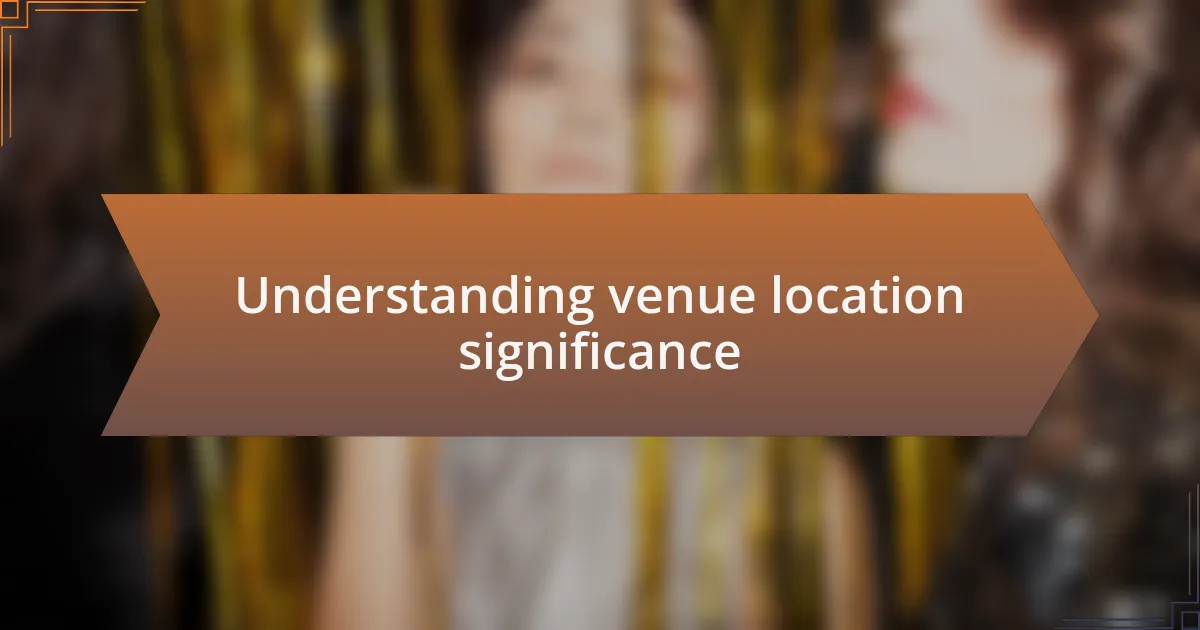
Understanding venue location significance
Choosing the right venue location can make or break an event. I remember planning a charity gala; the venue was in a less accessible part of town. The turnout was disappointing, and it hit home that even the best event cannot shine if it’s hard for attendees to get there.
The emotional connection that a venue provides is often underestimated. Have you ever walked into a space and felt an instant sense of belonging? This feeling can significantly enhance the experience for guests. A location that resonates with the theme of the event can create lasting memories.
Accessibility and visibility are critical elements in venue selection that should not be overlooked. Think about it: how often do you attend events in locations that are difficult to reach or even find? A convenient location encourages attendance and engagement, while a cumbersome one might lead to frustration and missed opportunities for connection.
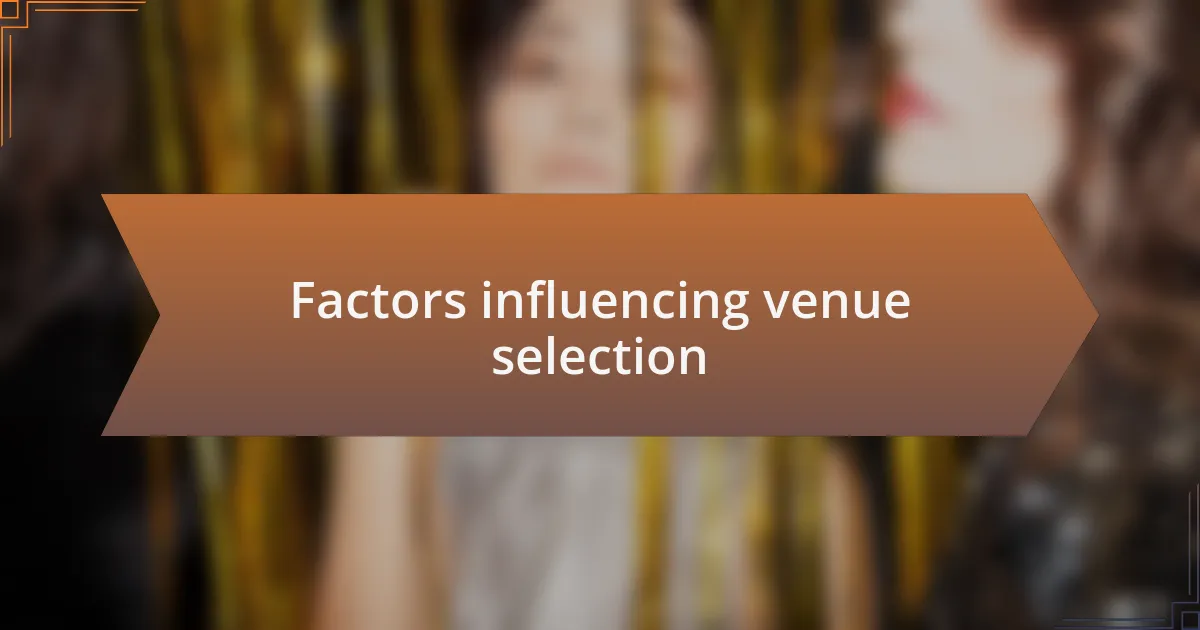
Factors influencing venue selection
When it comes to venue selection, I often consider the space’s capacity and layout. I vividly remember an industry conference where the venue felt cramped, stifling the energy in the room despite the impressive speakers. A well-designed layout that accommodates movement can foster networking and collaboration, making it vital for engagement during any event. The flow of the space should not only be functional but also inviting.
Another crucial factor is the venue’s amenities. For instance, I once attended a workshop in a location equipped with modern tech facilities, which significantly elevated the experience. Having reliable audio-visual equipment and good Wi-Fi can make a world of difference. After all, what good is a brilliant presentation if the technology fails?
Lastly, I think about the surrounding environment. I remember hosting a team-building retreat near a scenic waterfront. The natural beauty not only enhanced the vibe but also encouraged relaxation and creativity. The right ambiance can transform an ordinary gathering into an extraordinary experience, making attendees feel refreshed and more engaged.
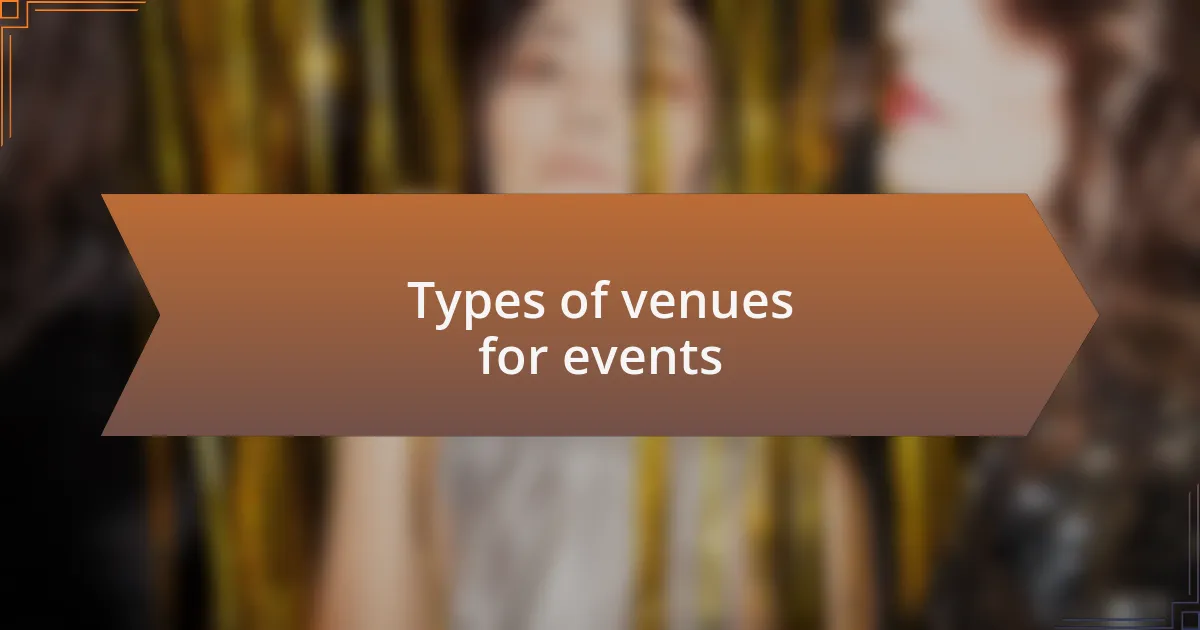
Types of venues for events
When planning an event, I often explore a variety of venue types to find the perfect fit. For instance, multifunctional spaces like community centers can be a hidden gem. I remember organizing a charity gala in one, where we transformed a simple hall with decorations and lighting. It was amazing to see how a blank canvas could become a stunning backdrop for both the cause and the community.
Outdoor venues also hold a special place in my heart. Picture this: an open-air wedding under a canopy of twinkling stars. It’s a choice that adds an element of magic and intimacy, inviting nature to be part of the celebration. I’ve found that these events can create a sense of wonder that a traditional indoor setting rarely achieves, making the evening unforgettable for everyone involved.
On the flip side, corporate events often require more formal venues, like hotels or convention centers. I recall attending a networking event in a high-rise venue with a panoramic view of the city skyline. The ambiance was professional yet inspiring, reminding me just how much a venue can impact the mood and tone of the gathering. Can you imagine trying to foster meaningful business connections in a dull space? The venue choice can either lift spirits or dampen them, so it’s crucial to consider how each type resonates with your event’s purpose.
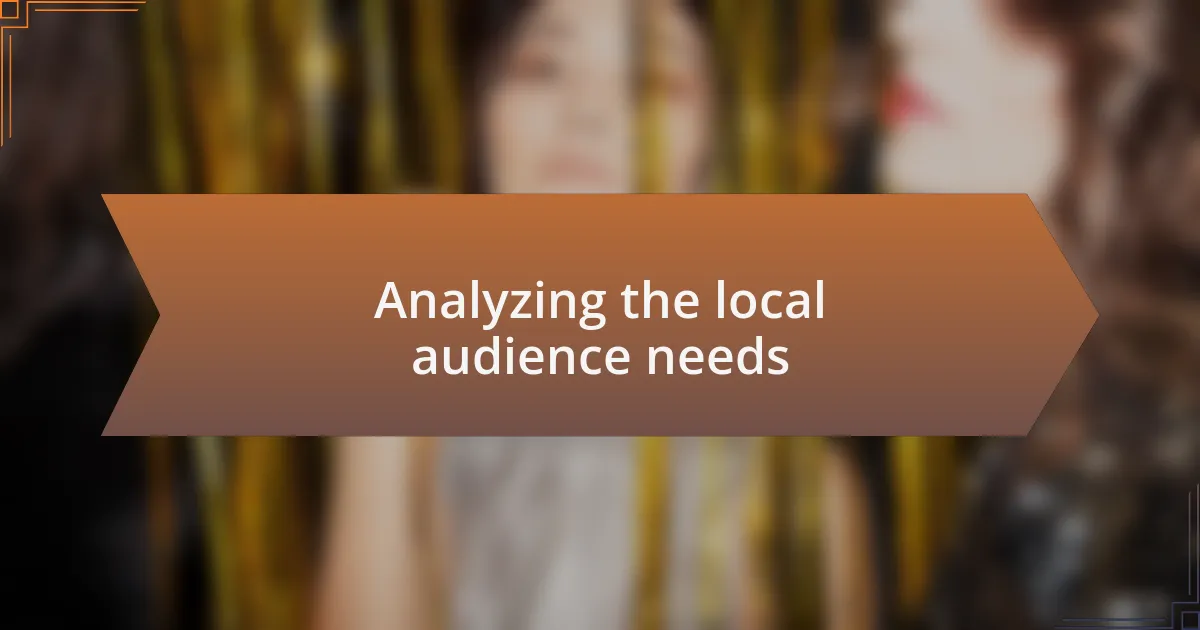
Analyzing the local audience needs
Understanding the needs of your local audience is essential for successful event management. I remember planning a community festival and realizing that our audience craved interactive experiences, not just passive entertainment. This insight changed everything—having local musicians perform and featuring food trucks from neighborhood vendors created a vibrant atmosphere that truly resonated with attendees.
When analyzing the local audience, I often consider demographics and cultural preferences. For instance, during a recent event, I discovered that many in our community valued sustainability. This knowledge encouraged us to partner with eco-friendly vendors and promote green practices, making the event not just enjoyable, but meaningful to those who attended. How can we expect our events to be memorable if they don’t align with the values of our guests?
Moreover, I always pay attention to the feedback loops from previous events. After one such gathering, I received numerous comments about the lack of accessibility. This prompted me to incorporate features like wheelchair ramps and sign language interpreters in future events. It’s fascinating how listening to the audience not only enhances their experience but can also create a deeper connection with the community.
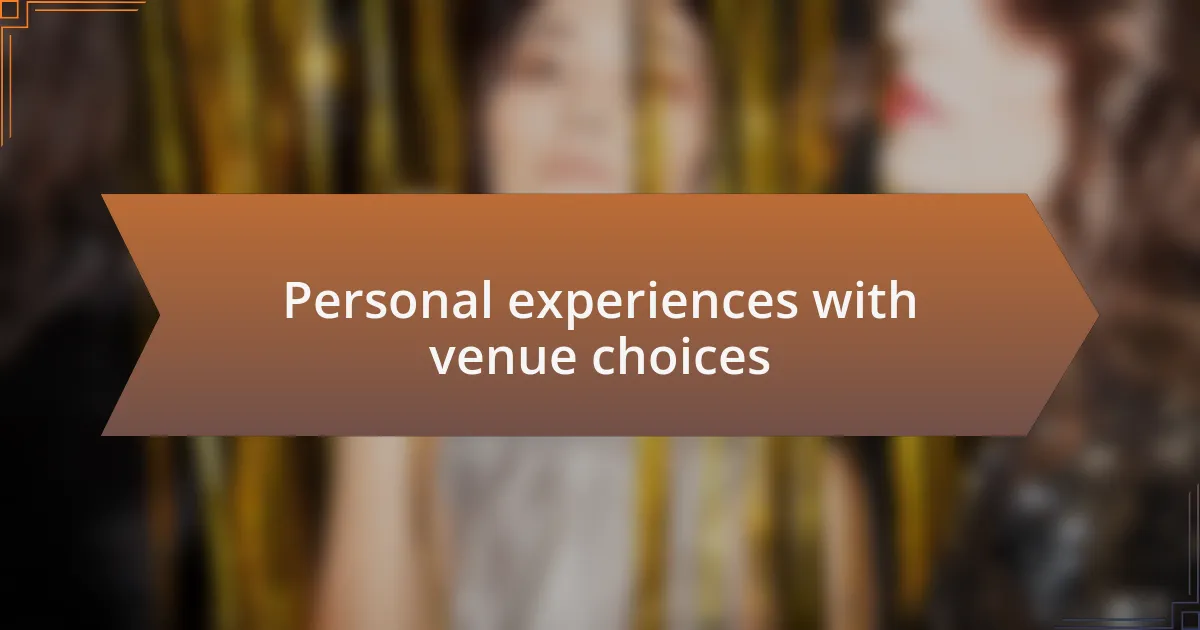
Personal experiences with venue choices
Choosing the right venue has been a game-changer in my event planning journey. I recall an agricultural fair where we initially booked a large indoor space, only to find out that the participants preferred an open-air environment. Switching to an outdoor venue not only boosted attendance but also created a lively atmosphere. It’s moments like these that remind me how crucial it is to align the venue with the event’s essence.
In another instance, I was determined to host a corporate retreat in a chic downtown location. But as discussions unfolded, we realized that many attendees lived farther out and preferred a venue closer to nature. We ended up selecting a rustic lodge nestled in the woods, which fostered a sense of relaxation and camaraderie. I now know that the right location can transform a mundane gathering into something memorable—who doesn’t enjoy breaking away from the office in a serene setting?
I also recall a charity gala where we settled on a beautiful historic theater, envisioning elegance and charm. However, when the event started, the acoustics became an issue, drowning out heartfelt speeches. This experience reinforced my belief that aesthetics aren’t everything. It’s essential to consider functionality alongside beauty. After all, who wants to raise money for a cause if no one can hear the stories behind it?
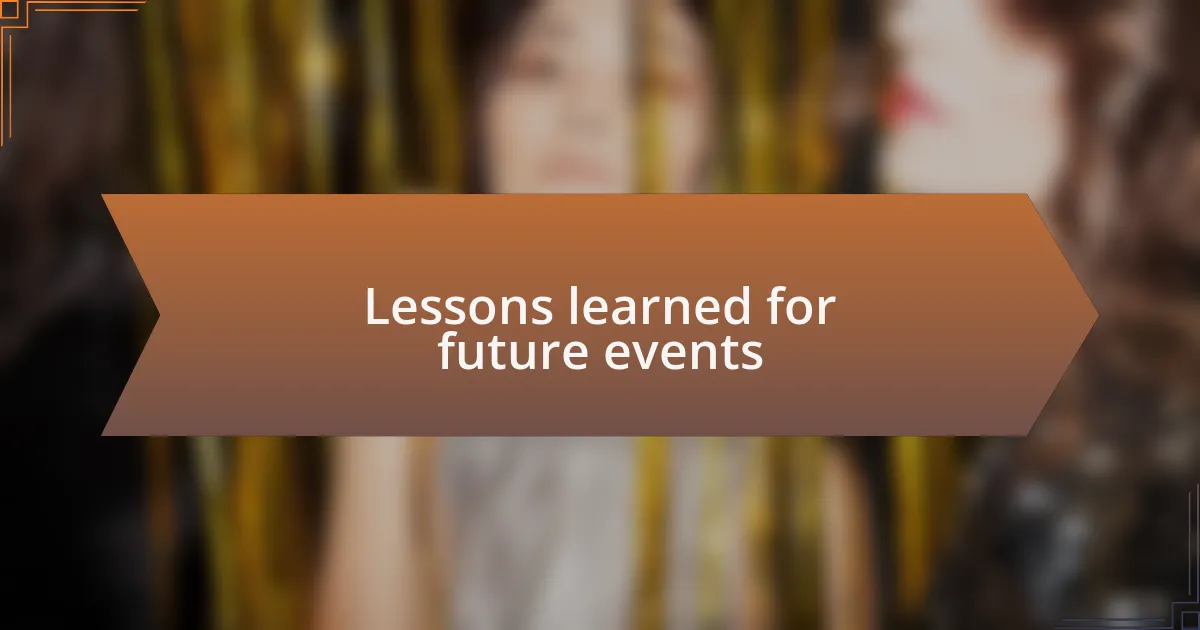
Lessons learned for future events
When planning future events, I’ve learned the importance of conducting thorough venue research. I once organized a fundraiser at a community hall that seemed perfect on paper—ample space and affordable rates. However, we didn’t account for accessibility issues; many guests arrived late due to difficulty finding parking. This experience taught me that convenience should never be overlooked.
Another lesson that stands out for me is the necessity of flexibility in venue selection. During a recent outdoor music festival, unexpected rain forced us to quickly find shelter. Thankfully, we had a backup plan to use a nearby indoor space, which turned out to be a wise decision. Now, I always ensure there’s a contingency plan, because weather conditions can change suddenly, impacting the entire event experience.
Additionally, engaging with your audience when selecting a venue is invaluable. I remember organizing a small workshop and assuming a trendy café would attract participants. It wasn’t until I consulted potential attendees that I discovered many felt more comfortable in a community center setting. This shift not only increased attendance but also made participants feel more at home. Listening to your audience can lead to significant insights that transform an event from good to unforgettable.